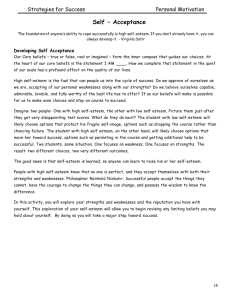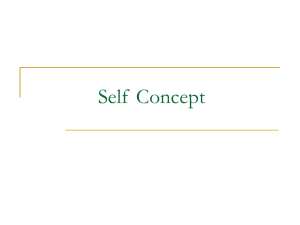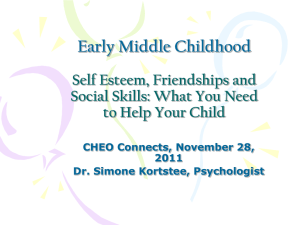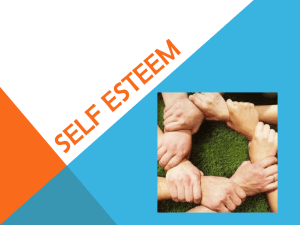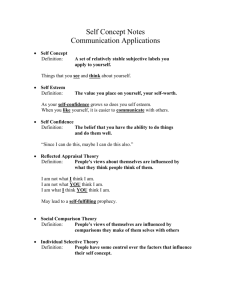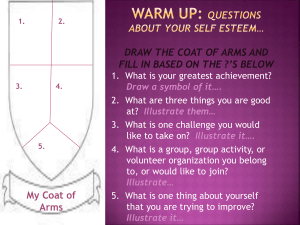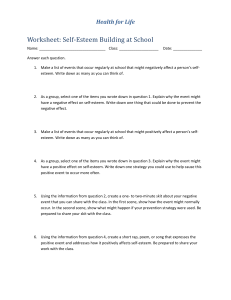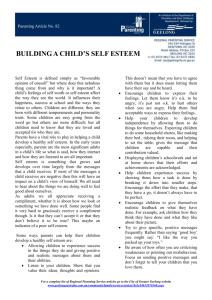The word 'esteem' comes from a Latin word that means 'to estimate'
advertisement
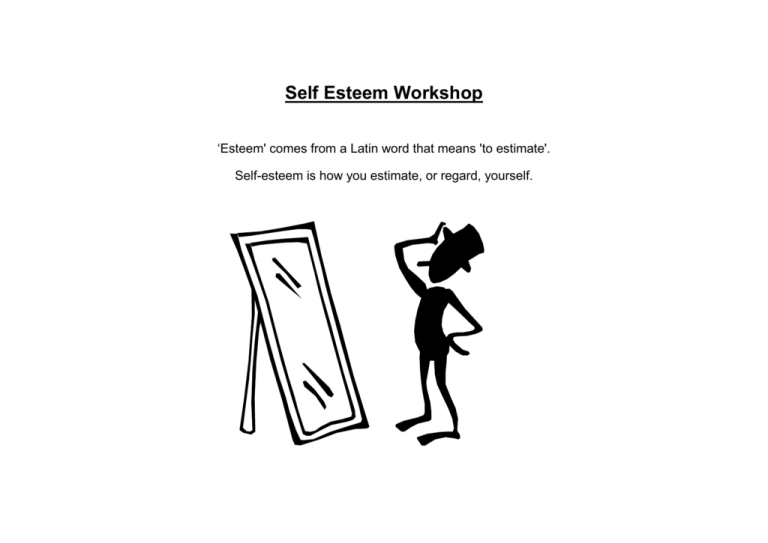
Self Esteem Workshop ‘Esteem' comes from a Latin word that means 'to estimate'. Self-esteem is how you estimate, or regard, yourself. Self esteem is not the same as confidence, you can appear confident publicly but inside you may feel worthless and inadequate. How do you regard yourself? Ask yourself the following questions. Do I like myself? Do I think I'm a decent person? Do I think I am worthy of love? Do I deserve happiness? Do I respect myself and expect others to treat me with respect? Am I able to say No to things I don’t want? Am I able to achieve the things I want to achieve on the whole? Do I feel I have power and control over my life? Do I take responsibility for my mistakes but not for other people’s mistakes? People with low self-esteem find it hard to answer yes to these questions. What causes low self-esteem? Multiple stressors Stressful life events knock us temporarily and usually we recover with some support and get back to life feeling reasonably OK about ourselves. If you fail an assignment when all in life is going well, it may be devastating, initially, but once the shock has worn off you have a good chance of finding the resources to cope resubmit and pass the assignment. However if you fail an assignment at a time when you have just split up with a boy/girl friend and the next day you hear that a grand-parent has a terminal illness, then recovery is bound to be much more difficult. Multiple stressors are more likely to affect our self esteem for longer. Physical ill-health Our self-esteem is bound up with our physical wellbeing. Our ability to do things physically affects the way we perceive our general ability in life. If we get ill, it can feel as if our body has betrayed us. Our trust in the world as a safe place may be shaken, temporarily. If the illness or accident involves hospitalisation, it can further damage our self-esteem. If we have to manage a chronic illness then this can affect our self esteem long term. Persistent negative regard from others The way other people treat us can also affect our self-esteem; for example, if you have a tutor or fellow student who is constantly undermining your authority or questioning your work in a non-constructive manner, this can lead to you becoming unsure your ability to achieve what you once knew you were very capable of doing. Likewise, at home; if another member of the family is constantly criticizing or ridiculing everything you do, eventually you believe that maybe you really aren’t good enough and begin to feel worthless. A sense of powerlessness The more powerful we feel in our lives, the better our self- esteem. Failing an assignment may not feel so bad if you accept you didn’t put the work in because you were out partying too much that term and you think you can pass it if you knuckle down and resubmit. If you are the only one of a racial or social minority that has failed the assignment despite thinking you had submitted a good effort, and have reason to believe that you are the victim of prejudice then needless t o say you are likely to feel powerless and devastated. The degree of power you have depends not just on who you are, but also on social context. If you are not sure of your ground in any sense (for example because you are in a foreign culture, speaking an unfamiliar language, or in an unfamiliar role) you may feel less empowered. How does childhood experience affect self-esteem? Children tend not to have much power or status in our society, and therefore sadly are often subject to many common experiences that can undermine their self-esteem. These include, in particular, bullying, racism, violence, loss, abuse (physical, emotional, sexual) and neglect. Childhood abuse or bullying of any kind can lead to a sense of worthlessness. In order to survive children often blame themselves for the hurt that is inflicted upon them leaving them to feel “not good enough”, “bad”, “naughty” and undeserving of love. Such feelings can then get carried forwards into adult life as a strong internal belief. As children we rely upon others to give us what is termed “positive regard”, this means validation that we are ok. Parents and teachers can be hard task masters and place conditions upon us in childhood as can society in general. Repeated expectations, rules and regulations throughout childhood eventually get internalized as absolute truths, some of these are useful and some can be disruptive and limiting in adult life. Think about some of the messages you received from parents and authority figures and from your cultural upbringing and decide which you want to keep and which to get rid of. Here are some examples: “If you don’t get your qualifications you’re going nowhere young lady”. “Big boys don’t cry”. “Work first! Play later!” “You won’t get anywhere with that kind of attitude.” “Don’t be selfish.” “If you’re not nice you won’t have any friends”. “If you don’t need it you shouldn’t have it.” “Life’s hard now stop moaning!” “People like us have to accept our lot; we don’t get on in the world”. “You’re a naughty girl.” “You’ll get fat eating like that” “You’re too skinny – you need feeding” “No-one will want to go out with you if you…..!” How can you improve your self-esteem? Normalise low self-esteem – you are not alone. Recognise that some of the most famous people despite having masses of confidence have low self esteem. Many actors and politicians suffer with depression and low self esteem despite performing exceptionally at their work. You are not alone! Honor the fact that you are a truly unique individual. Out of almost 7 billion people in the world, there is no-one exactly the same as you. If nature has bothered to create you as any other creature do you not think that you deserve to be on the planet? To be valued and respected as much as any other creature? Respect yourself; treat yourself as you would those you love. Give yourself permission to say yes and no – own your choice and power. Get your human frailty into perspective Give yourself the right to be human, to make mistakes. ‘To err is human' – in order to learn to walk we had to make lots of mistakes, fall over, get up, and bump into things before we mastered the art of walking – allow yourself to fall and get back up in all aspects of learning and life. It's not healthy to condemn ourselves because of one aspect of ourselves or behaviour. Sometimes we feel we are 'no good' because we have failed an exam or lost a job, or we have been unkind to a friend or let them down in some way. Try not to believe that the whole of you is hopeless, unkind or a failure, when really it is just one part of your behaviour that may not be as you would have liked it to be. Take control of your thoughts Take note of your thoughts; most of us have a range of thoughts flowing through our mind at varying speeds. Take time to observe and write down your thoughts about yourself, both the positive and negative thoughts that run through your head in different situations. Become aware of them, take time when in different situations to notice the negative thought processes and replace them with positive thoughts. If we tell ourselves” I can’t do this”, “no-one likes me”, “I’m stupid”, “I’m going to fail” then we will feel worthless, unlovable, and incapable and will begin to act accordingly. We have a lot invested in these old negative beliefs and it is often more comfortable albeit painful to stay believing them than to risk the possibility of change. Change takes work and is not always comfortable until it becomes habitual. We may begin by not believing new more positive ways of thinking do not give up, persevere, keep telling yourself the positive until you belief it. Remember it probably took a lot of negative events or messages to get you to this place of feeling bad about yourself it is going to take time and hard work to turn this around. You can do it! Techniques to improve self-esteem Keep a Thoughts and moods log. Use the thoughts diary attached to notice your thoughts in response to a certain situation. Write your thoughts down and notice how those thoughts make you feel. Now go back and consider how you might reframe more positively your thinking regarding the situation in hand and notice how this makes you feel (see Appendix A). Use positive affirmations. Having participated in using your thoughts diary notice the areas where you tend to think negatively. Create or borrow some positive affirmations to counteract these negative beliefs and practice saying them to yourself over and over each day. You may like to begin by looking in the mirror each morning and repeating the affirmations or sticking them on post-its around your room. Make time for yourself each day People with low self esteem often neglect their need to relax and support themselves as they are too busy trying to prove to themselves and others that they are good enough. Give yourself at least ten minutes a day to sit down in a place where you won’t be disturbed and remember a time when you were happy. Focus on the environment; who was present, how you felt, the smells, sounds, colours and allow yourself to go back and feel some of that happiness again. Focus on the positive Often we make ourselves unhappy because we focus on the mistakes we have made. We can improve our self esteem by focusing on what we did well. People with low self esteem don’t need to spend time focusing on the mistakes as they will stick in your mind all too easily. So when you feel you have made a mistake or acted in a way you wish you hadn’t done, rather than mulling it over endlessly write an account of what you did well that day, the things you achieved. If you feel you have achieved nothing at all because you stayed in bed all day feeling miserable then focus on your ability to get up and make yourself a cup of tea or go to the toilet when you needed to. There is always something we have managed in a day – focus on it and write it down. If your mind begins to wander back to all of the things you didn’t do well then focus back on the list of achievements and read them to yourself over again. List 50 things you like about yourself Take the time to form a list of things you like about yourself. Keep the list open and add to it, if your self-esteem is very low this may take some time, see it as a long term project. Alternatively you could make a collage of things that represent aspects of yourself that you like. This can include anything from characteristics to looks to friends you keep, to things you do or say, even one off actions. When you finally get to 50, place it somewhere and read it once a week then try to add one more thing that you like about yourself every couple of days. Get help for unresolved issues If you are aware that you have unresolved issues stemming from childhood that affect your self esteem today, take steps to get some support in working through this, see a counsellor, get some self help books out of the library, talk it through with a friend , write a journal. Resources Fennell, M. (2009) Overcoming Low Self-esteem. Constable/Robinson. Greenberger, D. and Padesky, C.A. (1995) Mind over Mood. Guilford Press. Dryden,W. (1999) How to Accept Yourself. Sheldon Books. Hay, L (2003) Self Esteem Affirmations: Motivational Affirmations for Building Confidence and Recognising Self Worth. Audio CD. Daily Thoughts and Moods Log (Appendix A) Step one: Describe the distressing event: ________________________________________________________________________________________________________ ________________________________________________________________________________________________________ ________________________________________________________________________________________________________ ________________________________________________________________________________________________________ ________________________________________________________________________________________________________ ____________________________________________________________ Step two: Record your feelings of distress and rate them from 0 -10 with 10 being the most intense form of distress and 0 the least. Use words such as angry, sad, anxious, jealous, powerless, frightened, isolated, worthless, hopeless, inadequate, and frustrated. Emotion E.g Anxious Rating 0-10 5 Step three: Thoughts, feelings and distortions. In column 1 write done a negative thought that you have about the event. In column two write down how this thought makes you feel. In Column 3 use the distorted thinking chart on the next page to identify how your thinking may be distorted and note the type of distortion. In column 4 write down a more realistic and balanced thought. Finally in Column 5 write down how the new thought makes you feel. Reflect on which way of thinking and feeling you prefer. Negative thought E.G I did really badly in that assignment I only got 58. I should have done better than that. I should have worked harder. I’m an idiot. Feeling Disappointed, frustrated, worthless, sad, and useless. Distortions All-or nothing thinking. Mental Filter “Shoulds” Labelling. Discounting the positives. Substituted thought I wanted to get somewhere in the 60’s for that assignment but I was struggling to grasp some of the concepts and things were tough at home so I couldn’t really put the time in that I needed. In light of this I did pretty well really. Feeling Compassionate to self, reasonably satisfied and content. Some minor disappointment and frustration regarding circumstances. Negative thought Feeling Distortions Substituted thought Feeling Distorted Thought patterns. 1. All or nothing thinking: You look at things in absolute, black and white categories. 2. Overgeneralizations: You view a negative event as a never-ending pattern. 3. Mental Filter: You dwell on the negatives and ignore the positives. 4. Discounting the positives: You insist that your accomplishments or positive qualities don’t count. 5. Jumping to conclusions: You conclude things are bad without any definite evidence: Mind Reading: You assume people are viewing you negatively. Fortune Telling: you predict that things will turn out badly. 6. Magnifications or minimization: You blow things out of proportion or you shrink your importance. 7. Emotional reasoning: You reason from how you feel – I feel like an idiot so therefore I am an idiot. 8. Should statements: You criticize yourself or other people with “shoulds”, “oughts” and “musts”. 9. Labelling: Instead of saying “I made a mistake” you tell yourself “I’m an idiot or a loser”. 10. Blame: You blame yourself for something you weren’t responsible for or you blame other people and overlook ways in which you contributed to the problem. Positive Affirmations Choose some of the following affirmations or create your own and use them a s a mantra each day. You could take the time you travel to University to repeat them over and over or alternatively look in the mirror and tell yourself these things as you brush your teeth in the morning. • • • • • • • • • • I am a truly unique individual I can be happy and successful I have the power to manage my life I can make my own choices and decisions I am free to choose to live as I wish and to give priority to my desires. I can manage my thoughts and feelings. I do the best I can at any given moment. I am loveable and valuable. I love my body just the way it is. It is okay for me to make mistakes.
